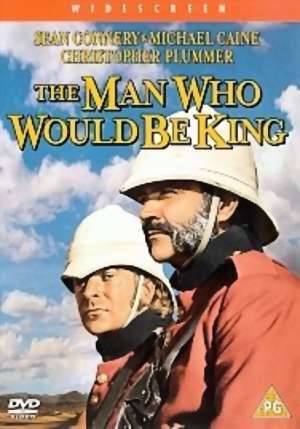|
|
LITR 5831 World / Multicultural Literature Colonial-Postcolonial |
|
|
Film / Video Highlights |
| The Man Who Would Be King |
Monday, 30 September
Film Highlight:
The Man Who Would Be
King
Presenter: Gregory Buchanan
Plot Summary
Set in the colonial India of 1885, the film follows the misadventure of two
British colonial non-commissioned soldiers, Peachy Carnehan and Daniel Dravot,
into Kafiristan (a province of Afghanistan) where they aim to befriend a local
chieftain, conquer his enemies through a locally-recruited army, and ultimately
seize his kingdom for themselves. Rudyard Kipling, a newspaper correspondent,
warns them of the difficulty of their plan, mentioning that the only person ever
to successfully precede them was Alexander the Great. Undaunted, the pair
reaches Kafiristan where they meet the English-speaking Gurkha soldier Billy
Fish who becomes their interpreter and cultural guide. Several military
successes follow their arrival, leading to the cessation of the wide-spread
tribal wars that had previously plagued the country. Daniel appears to suffer an
arrow to the heart while fighting among his Kafiristan army; in actuality,
however, the arrow only pierces a concealed bandolier, allowing Daniel to remove
the arrow in the presence of his followers. They subsequently regard him as a
god. Eventually the high priest of Kafiristan summons Peachy and Daniel to the
holy city established by Alexander. He discovers Danielís affiliation with
Freemasonry, which Alexander shared, and proclaims him the son of Alexander.
Daniel comes to believe that he is the son of Alexander and plans to modernize
the country in hopes of rivaling England. Peachy remains more pragmatic and
hopes to escape the country with the treasure of Alexander. At the height of his
delusion, Daniel decides to marry Roxana, a local woman sharing the name of the
queen Alexander married when in Kafiristan. Roxana bites Daniel at their
wedding, causing him to bleed. The priests realize that he is not a god, kill
him, and crucify Peachy. Peachy survives his crucifixion, so the priests release
him. He returns to India to relay his story to Kipling.
Application to Course Objectives 2a, 2b, and 7.
The film coheres with the course objectives because it features an exchange of
religious narratives as a plot device. (2a and 2b) Daniel manipulates an
apocalyptic narrative to his advantage. (7) The dialectical operation of self
and other is also present in non-religious instances, as the film depicts
certain cultural activities as similar to those of other cultures. (2a)
Scenes and Interpretations
Scene I. Peachy and Daniel are watching people playing a
Kafiristan sport that resembles English polo. Daniel, who previously told Peachy
to tolerate the customs of other cultures (specifically, pederasty), is repulsed
by the cultural alteration of a few sports rules. This is blatantly
hypocritical.
Question: What does this selective toleration of cultural
difference imply about the attitudes of colonizers toward the relationship
between self and other? Do self and other synthesize more readily in some ways
than others?
Scene II. The crucified Peachy finishes recounting his story
and presents Kipling with a token that demonstrates the potency of local custom.
This scene is interesting because earlier in the film we see Daniel plummet to
his death. Peachy even remarks that it took him half an hour to fall to the
bottom of the chasm. If the local people decapitated him, how did they find him?
In any case, the irony of not appreciating the process of cultural synthesis is
too strong to be overlooked. Daniel is the victim of the very cultural synthesis
that disgusted him.
Question: How is the tendency of colonizers to discredit local
custom addressed in this scene?
Additional questions
(from in-class handout)
1. When Peachy and Daniel first consider promulgating the lie that Daniel is a
god, Daniel tells Peachy that he considers the idea blasphemous. Later in the
film, he contradicts himself, saying that he feels destined to rule Kafiristan.
Alexander also promulgated a myth of divine origin in his conquests. What does
this reveal about the insecurity of the colonizer?
2. The religion of Kafiristan is portrayed as removed from the concerns of its
laity. Trains of priests wander blindly through the countryside, ignoring the
widespread violence and cruelty around them. While the people of Kafiristan
clearly respect them, it is likely that they do not profit much from their
observance. Is this a criticism of the inaccessibility of native religion, and,
if so, to what extent can colonization be considered reform?


